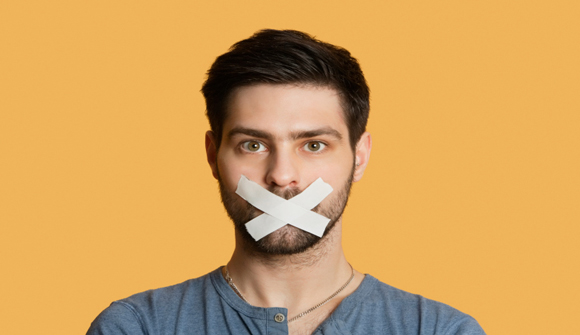

On June 17, 2013, the United States Supreme Court (SCOTUS) further eroded one of the most potent protections Americans had against unfettered authority: the right to remain silent. In Salinas v. Texas, SCOTUS ruled that a defendant's refusal to answer police questions before his arrest and before being Mirandized could be admitted into court as substantive evidence of his guilt. If such a defendant did not explicitly invoke the Fifth Amendment, then he had effectively waived it.
Last week, the California Supreme Court expanded the SCOTUS precedent. It restored a 2007 vehicular manslaughter conviction that had been reversed by a lower court. The original conviction had been appealed on the grounds that the defendant's silence was introduced as evidence against him. The 'damning' silence was not a refusal to answer police questions. Rather, at the scene of the car crash, the defendant had not inquired about the welfare of those in the other vehicle. This, the prosecutor argued, was proof of his guilt. The jury agreed.
There are many reasons to remain silent when confronted by the police or by a legally precarious situation. For one, lawyers and legal sites strongly advise people to do so. Even totally innocent people can incriminate themselves by making confused statements. Now both silence and words could become evidence of guilt.
History offers a glimpse into why certain rights came into prominence and what life might resemble without them.
A History of "Taking the Fifth"
The Fifth Amendment to the Constitution reads, "No person… shall be compelled in any criminal case to be a witness against himself." The clause came from the Virginia Declaration of Rights (1776) as drafted by George Mason. Mason, along with James Madison, is often viewed as the father of the Bill of Rights, which reined in the power of the federal government vis-a-vis individuals. Procedural rights of an accused were of particular concern because Mason was well aware of abuses committed by English courts, both ongoing and in the past. Well read in the literature surrounding those abuses, Mason insisted the rights of men take priority over the privileges of power.
The legal protection against self-incrimination was a response to England's history of forcing information and confessions through torture. The practice came into prominence when Henry VIII denied papal authority over England (1534) and established the Church of England with himself at the head. The new church retained most of the trappings of Catholicism, and Protestants became especially vulnerable to arrest for heresy.
The Protestant John Lambert became the first Englishman known to proclaim his right against self-incrimination. During his 1538 trial for heresy before an ecclesiastical court, Lambert claimed compelling a man to accuse himself violated the will of God and common law. He informed the court that he would be "more than twice a fool to show" his heresy "for it is written in your own [common] law, No man is bound to betray himself." Lambert' was responding to the practice of requiring a defendant to answer questions without revealing the charges against him. Thus, a defendant could be trapped into admitting a crime and forced to name other heretics. Silence was deemed a confession. Lambert was burned at the stake.
In 1563, the Protestant John Foxe published the Actes and Monuments, which is commonly known as Foxe's Book of Martyrs. The history of Protestant suffering under the Catholic Church became wildly popular and was reportedly second only to the Bible in England during the 16th and 17th centuries. The book urged people to demand procedural rights against authority, including the right to remain silent.
In 1590, the Puritan John Udall was accused of penning objectionable religious tracts and questioned by the secretive Court of the Star Chamber. When asked about the tracts, Udall replied, "If I were the author, I think that by law I need not answer." He claimed that self-incrimination "did not comport with [the] Magna Carta." Charged with sedition, Udall became the first defendant in a common-law trial to declare his right to remain silent. He died in prison.
The 17th century Levellers undoubtedly exerted the most influence on the Founding Fathers on this issue. In his two-volume work, An Austrian Perspective on the History of Economic Thought (1995), Murray Rothbard described the Levellers as "the world's first self-consciously libertarian movement…. [T]he Levellers led by John Lilburne, Richard Overton and William Walwyn worked out a remarkably consistent libertarian doctrine." Part of the consistency was the right to remain silent. A petition to Parliament written by the Levellers called for freeing "all men from being examined against themselves, and from being questioned or punished for doing that against which no law hath been provided."
Lilburne was called before the Court of the Star Chamber in 1637 for the crime of circulating Puritan literature. When asked how he pled, Lilburne refused to take an oath or answer incriminating questions. Instead, he appealed to his "freeborn right" to be justly tried; he became widely known as "Freeborn John." Lilburne was fined, whipped, pilloried and sentenced to prison. While there, he wrote an account of his treatment entitled The Work of the Beast. Lilburne and the book are largely credited for the closure of the Star Chamber in 1641 and for the establishment of the right to remain silent in religious courts. He then fought for procedural rights in common law ones.
In 1646, the Levellers published "An Agreement of the Free People of England. Tendered as a Peace-Offering to this distressed Nation." Their manifesto for the reform of civil rights prominently included the right against self-incrimination. In the section headed "We agree and Declare," the first item listed is "it shall not be in the power of any Representative, to punish, or cause to be punished, any person or persons for refusing to answer questions against themselves in Criminall cases." If the language of "An Agreement of the Free People" seems familiar, it is because Mason and other Founding Fathers were well aware of it.
After all, Puritans who fled to the New World carried the Levellers' ideals and works with them.
Significance of the Right to Remain Silent
The right to remain silent is at the core of American due process. It is historically anchored in the quest for religious freedom that was instrumental in founding America. It served as the strongest single protection against the use of torture by state authorities.
Today, security is said to trump liberty. Due process guarantees are often viewed as obstacles to security because they shackle authorities who are allegedly hunting terrorists and the like. It is true that due process occasionally protects the guilty. But what it always protects are average people who would otherwise be targets for the exercise of arbitrary power.
The great wrongs of history, such as religious persecution, gave rise to solutions that preserved human rights and dignity. Forgotten history repeats itself. Forgotten wrongs do so as well. The right against self-incrimination arose as a protection against the use of torture to compel confessions. Without a suspect's right to silence, the authorities have the privilege of making him speak. That could be the next logical step in the utter erosion of this indispensable protection.
